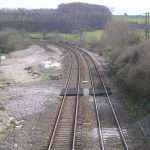Was it car ownership that caused the demise of the travelling salesman? Did being able to regularly go to shops for ourselves mean there was no longer a need for the men (and it always seemed to be men) who came door to door with their cases of products?
Living in a small, isolated village, three miles from the nearest bus stop, perhaps we had the travelling salesmen for longer than those who lived in towns and cities.
There must have been some products that were more popular than others when it came to doorstep sales. The men from Betterware and Kleeneze continued to call with cleaning cloths, sponges and sprays long after other salesmen had disappeared. Perhaps it was their catalogue that secured the sales. Each month they would drop in a catalogue, calling back to take orders, and then bringing the goods. The catalogue offered a wide range of goods, pictured in an optimum way; selling wares from a suitcase may not have been as easy.
The catalogue system did mean the men were sure of their money, payments being sent in with the order, or made when the goods arrived. People did not need credit for small household items. Door to door selling must have been much more difficult when the salesman provided both the product and the finance which allowed people to purchase the products.
One travelling salesman sold clothes, for which people were allowed to pay on a weekly basis. There was no charge for the credit, all that had to be repaid was the price of the garments. Presumably, the cost of credit was incorporated in an initial price that had been set higher than if the clothes had been bought in a shop. The clothes seller was a softly spoken, gentle and kindly man, perhaps that was his selling pitch, but it would have been hard to have imagined him trying to recover debts from someone who had not paid. Perhaps he chose carefully those to whom he allowed credit; perhaps he was the only option if they wished to buy clothes for their families.
It is hard now to remember the individual characters of those who called at our house. It must have demanded a hugely resilient spirit to set out morning after morning in the hope of earning sufficient commission to make the day’s work worthwhile. To have smiled when every door was opened would have demanded extraordinary positivity. The online world will never be the same as those who knocked at the door.



